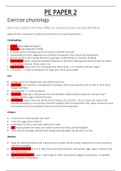PE PAPER 2
Exercise physiology
Diet and nutrition and their effect on physical activity and performance
balanced diet is essential for optimum performance in all sporting activities
Carbohydrates
• simple: easily digested (sugars)
• complex: longer digestion (bread)
• principle source of energy used by the body at all levels of activity
• carbohydrate in food is digested and converted into glucose, then enters the bloodstream.
• glucose stored in the muscles and liver as glycogen. limited stores so constant refuelling
• low GI foods: slower, sustained released of glucose to the blood. blood glucose levels remain for longer.
3-4hrs before exercise. bread, pasta, rice
• high GI foods: rapid, short rise in blood glucose (short lived). 1-2 hrs before exercise. Sugars
• 1 hr before —> liquid consumptions through sport drinks and cordials
Fats
• energy source for long duration, low intensity exercise
• trans-fats: meat and dairy, hydrogenation (hydrogen add to liquid veg oils) and oil solid at room temp.
(longer shelf life)
• saturated fats —> animal products
• too much: weight gain, reduced stamina and flexibility, health problems (high BP, coronary heart
disease, diabetes, high cholesterol levels)
• cholesterol: made in liver and carried by the blood as LDL and HDL. LDL: too much can lead to fatty
deposits developing in the arteries, therefore negative effect on blood flow. HDL: takes cholesterol away
from where it has accumulated to the liver where its then deposited
Proteins
• necessary for muscle growth and repair
• meat, fish, eggs, dairy products
• combination of many chemicals called amino acids
• use: muscle growth and repair and make enzymes hormones and haemoglobin
• minor source of energy. provide more energy when glycogen and fat stores are low
Vitamins
• keeps an individual healthy with a good immune system and this allows a performer to train maximally
and recover quickly
• fat-soluble vitamins: A, D, E, K. fatty foods and animal products. dairy goods, eggs, veg oil. stored in liver
and fatty tissues.
• water-soluble vitamins: B and C. wide range of foods. not stored so regular consumption. no benefits
with excessive consumption





